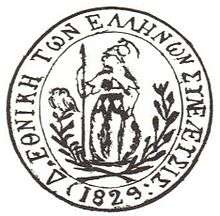Fourth National Assembly at Argos
The Fourth National Assembly at Argos (Greek: Δʹ Εθνοσυνέλευση Άργους) was a Greek convention which sat at Argos from 11 July to 6 August 1829, during the Greek War of Independence.

Seal of the national assembly
The Fourth National Assembly followed on from the Third National Assembly at Troezen (1827), which had adopted a new constitution selected Ioannis Kapodistrias as Governor of Greece with extensive powers for a seven-year term. The Assembly counted 236 representatives from all over Greece (including territories, such as Crete or Macedonia, that were still under Ottoman control), for the first time elected via suffrage.
The Assembly adopted a series of reforms suggested by Kapodistrias, most notably:
- the replacement of the Panellinion advisory council with a 27-member Senate
- the adoption of the phoenix as the country's currency
Members of the National Assembly
- Andreas Metaxas leader of the Russian Party
- Theodoros Kolokotronis (Russian Party)
- Spyridon Trikoupis (English Party)
- Ioannis Orlandos (English Party)
- Yannis Makriyannis (French Party)
- Ioannis Kolettis (French Party)
- Dimitrios Voulgaris (French Party)
- Benizelos Rouphos (French Party)
- Georgios Kountouriotis (French Party)
- Dimitris Plapoutas
- Vasileios Dimitrakopoulos
- Georgios Sisinis member of Filiki Eteria
- Anagnostis Matsoukas
- Andreas Zaimis
- Sotirios Theocharopoulos member of Filiki Eteria
- Georgios Michalakis
- Andreas Kalamogdartis
- Nikitas Stamatelopoulos
- Rigas Palamidis
- Anagnostis Kondakis
- Mitros Anastasopoulos
- Kostas Botsaris
- Theophilos Kairis
- Dimitris Tsokris
- Dimitris Perroukas
- Anagnostis Makrypoukamisos
- Georgios M. Antonopoulos
- Georgios Agallopoulos
- Iakovos Paximadis
- Petrobey Mavromichalis
- Georgios Mavromichalis
- Tatsis Magginas
- Panagiotis Dimitrakopoulos
- Frangiskos Mavros
- Georgios Chrysidis
- Panagiotis Naoum member of Filiki Eteria
- Lykourgos Logothetis member of Filiki Eteria
- Konstantinos Bellios
- Chatzilias Oikonomou
- Christoforos Perraivos member of Filiki Eteria
- Drosos Mansolas
- Georgios Ainian member of Filiki Eteria
- Gerogios Psyllas
- Stamos Staikos
- Andreas Iskos
- Anagnostis Monarchidis
- Georgios Daskalopoulos
- Vasileios N. Boudouris
- Emmanouil Tombazis
- Anagnostis Anagnostopoulos
- Loukas Rallis
- Christodoulos Klonaris
- Athanasios Tsakalov member of Filiki Eteria
- Antonios Georgantas
- Anagnostis Chatzianargyrou
- Manouil Vernardos member of Filiki Eteria
- Georgios Logiotatidis
- Vasileios Petimezas
- Panagiotis Zapheiropoulos
- Nikolaos Poniropoulos
- Konstantinos Metaxas
- Nikolaos Spiliadis
- Lysandros Vilaetis
- Konstantios, Metropolitan of Maroneia
- Georgios Valtinos
- Konstantinos Schinas
- Georgios Mavrommatis
gollark: But what's the actual *benefit* of doing so?
gollark: If it doesn't, it would probably have problems.
gollark: User code presumably knows whether what it has is a UDP socket, TCP socket, or file.
gollark: Are syscall numbers scarce somehow?
gollark: I don't see the value in packing multiple different things into one syscall because the arguments happen to be the same when the kernel will have to check and dispatch to different things *anyway*, and user code also has to use a specific known form anyway.
This article is issued from Wikipedia. The text is licensed under Creative Commons - Attribution - Sharealike. Additional terms may apply for the media files.